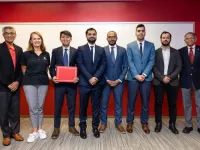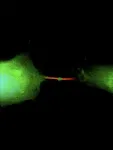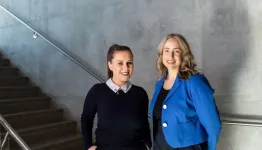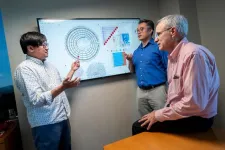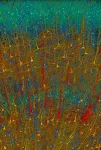(Press-News.org) The world is full of good ideas, but only some of them become viable and real.
“You don’t see the full impact of a good idea until someone figures out a way to convert it to a usable product or service that has value, brings it to market and makes money off of it – this is what makes it a sustainable business,” said S. Radhakrishnan, a retired University of Houston business professor and coordinator of UH Energy’s Innovation Commercialization Competition. “To have a successful energy transition, we need many innovative ideas to be commercialized.”
Keeping this in mind, Radhakrishnan worked hard to grow the second annual Energy Innovation Commercialization Competition – from five teams last year to 18 competing teams this year. The competition was open to graduate students from different disciplines working on a broad range of energy-related research across the UH System.
After judges whittled the entries down to five finalists, the teams pitched their findings to a final panel of volunteer judges representing Houston’s dynamic energy industry. The final presentations covered everything from carbon capture, carbon sequestration and lithium extraction from geothermal operations.
Two winners were selected:
ECHO: UH-Chevron Energy Transition Energy Innovation Challenge Winner.
The ECHO team, made up of four UH environmental engineering doctoral students – Prince Aleta, Ahmad Hassan, Mohsen Afshari and Abdelrahman Refale and advised by Mim Rahimi, assistant professor of environmental engineering at the UH Cullen College of Engineering, won the first UH Energy Innovation Commercialization Competition. The team pitched a novel technology called ECHO, which is short for Electrochemical CO2 Harvester from the Ocean. It employs a membrane-less electrochemical process fueled by renewable energy to harness the ocean’s natural carbon dioxide absorption capacity to capture carbon dioxide efficiently and sustainably. This innovation seamlessly integrates with existing seawater intake infrastructure, offering a proactive approach to reducing carbon dioxide emissions from marine industries.
GeOME Analytics: Overall Energy Winner – UH Energy Innovation Challenge Winner
GeOME Analytics, led by Preethi Gunaratne, Moores Professor of Biology and Biochemistry at the UH College of Natural Sciences and Mathematics, is a UH startup. The team pitched a field-portable genomics-based approach to reservoir drainage diagnostics for the oil and gas industry. GeOME Analytics has established a field-tested platform that extracts and integrates personalized DNA biomarkers from multiple pads to provide metrics for upstream asset development. GeOME uses the technology to monitor fields during the full production cycles to predict drainage heights, percentage contributions, as well as well-to-well and pad-to-pad communication. Gunaratne, director of UH Sequencing and Gene Editing Core, is the co-founder, president and more at GeOME. Other team members include Marcus Phillips, vice president; postdoctoral researchers Partha Bhagavanthula and Nuwan Acharige; and UH graduate students – Micah Castillo, Dishan Adhikari and Shiyanth Thevasagayampillai.
“We have been excited about this technology, because from the very beginning we felt it had a lot of potential,” said Prince Aleta, a civil and environmental engineering doctoral student and member of the ECHO team. “It’s a very serious issue as far as the need to capture carbon to achieve our climate goals, so we really pushed for it.”
For Ahmad Hassan, a fellow doctoral student and team member, the competition was eye-opening – not only from a business sense but also as a confidence boost.
“As we’re from the STEM field, we normally work in lab environments, and I hear people say that what we’re working on has less commercial value and that it would take ages for them to commercialize,” Hassan said. “This gave us the confidence and motivation to move forward.”
He hopes the team’s experience and success inspires other students.
UH Vice President for Energy and Innovation Ramanan Krishnamoorti said this competition not only influences the future of energy, but also redefines the benchmark for brilliance at UH.
“At the University of Houston, we are preparing future leaders and innovators by enabling them to transform the global energy ecosystem with ideas and technologies that are not only cutting-edge and innovative but also valuable to society,” Krishnamoorti said. “We must vividly demonstrate the transformative power of their actions and the power of learning by doing. This competition does that.”
The ECHO team won a $25,000 award from Chevron that will help continue their quest toward commercializing their research.
“The technology that was on display was fascinating,” said Liz Schwarze, vice president of global exploration for Chevron Corp. and sponsor of this year’s competition. “I’m optimistic we can continue to grow this program, because it’s all about creating a culture where we can pursue our scientific and engineering dreams while partnering with business and entrepreneurship along the way to spinoff value to our community faster.”
The other finalists:
Team LiQuidium – Pranjal Sheth, Parisa Taheri, Erin Picton; advised by civil and environmental engineering professor Devin Shaffer. Their presentation focused on lithium extraction from geothermal brines.
Aldrogen – Massiagbe Diabate and Bharat Bohara; advised by electrical and computer engineering professor Harish Krishnamoorthy and engineering technology professor Jian Shi. Their pitch centered on an A.I.-powered solution to improving grid resiliency while reducing emissions.
MacAlgae – Mahsa Alian; advised by biotechnology professor Venkatesh Balan and mechanical engineering professor Zhu Weihang. This project displayed an environmentally conscious method of mycelium production.
UH Energy, an umbrella for all University of Houston’s energy-related initiatives and programs, focuses on encouraging academic contributions for the energy transition in three distinct areas: research, innovation and education. Part of that effort involves fostering opportunities for students to contribute new solutions to address key issues in energy.
UH, a Carnegie-designated Tier One Research University, encourages students at all levels to engage in innovative and meaningful research. It is this relentless commitment to student success, cutting-edge research and real-world impact that is driving the University closer to realizing its vision of becoming a top 50 public university in the nation.
END
UH energy competition focuses on innovation, commercialization and sustainability
2023-10-06
ELSE PRESS RELEASES FROM THIS DATE:
Remnant of cell division could be responsible for spreading cancer
2023-10-06
Once thought to be the trash can of the cell, a little bubble of cellular stuff called the midbody remnant is actually packing working genetic material with the power to change the fate of other cells — including turning them into cancer.
It’s a surprise to many people, according to Ahna Skop, a University of Wisconsin–Madison genetics professor, that when one cell divides into two, a process called mitosis, the result is not just the two daughter cells.
“One cell divides into three things: two cells and ...
CPR education drive expanded to London during the 2023 NFL London Games
2023-10-06
Photos will be added to the release link as available.
On average worldwide, fewer than one in every ten cardiac arrest victims outside of the hospital survive.[1] Too many people do not survive from cardiac arrest because those around them are not educated on the lifesaving skills of cardiopulmonary resuscitation (CPR). Knowing CPR can be a lifesaving tactic. On October 7, 2023, the Chasing M’s Foundation - professional football player Damar Hamlin’s charity - the American Heart Association, the British Heart Foundation ...
Possible tool discovered to diagnose common contributor to vascular dementia
2023-10-06
A research team led by the Keck School of Medicine of USC has discovered that a non-invasive eye exam may be a possible tool for screening Black Americans and other people from underdiagnosed and high-risk populations for cerebral small vessel disease, a major contributor to cognitive impairment and dementia. After Alzheimer’s disease, vascular dementia, associated with impaired blood flow to the brain, is the second most common dementia diagnosis.
“Most people with cerebral small vessel disease are not diagnosed until significant brain damage has occurred. Damage to the brain cells is not reversible.” ...
Research reveals disparities in access to quality parks
2023-10-06
In urban areas throughout the United States, it is imperative for all communities to have equal access to high quality parks. These parks can have many benefits for the physical and mental well-being of the residents who live in close proximity to the urban green spaces. For instance, they are a place to socialize and exercise outdoors while also providing vegetation nearby, which can help reduce urban heat.
Yet, in the City of Philadelphia, not all parks are created equal, according to a new study from the University of Delaware.
Using a machine learning algorithm to analyze 285 ...
Offspring of teen, young adult women with cancer history more likely to have birth defects
2023-10-06
The offspring of adolescent and young adult women with a history of cancer face a higher risk of birth defects, according to new research from UTHealth Houston.
A study led by Caitlin C. Murphy, PhD, MPH, associate professor of health promotion and behavioral sciences at UTHealth Houston School of Public Health, was published recently in Cancer Epidemiology, Biomarkers & Prevention.
“Concerns like the health of future children are at the top of mind for many young adults diagnosed with cancer, but they are already so overwhelmed at the time of diagnosis with ...
Benefits of psychedelics in obsessive-compulsive disorder: in search of evidence
2023-10-06
Intrusive thoughts, involuntary repetition of undesirable gestures and behaviors combined with high anxiety... Obsessive-compulsive disorder (OCD), a disabling condition, affects around 2% of the population, regardless of age. It is a strong vector of isolation since patients disproportionately focus on various obsessions—to the detriment of relationships, work, and leisure.
Treatment mainly consists of cognitive-behavioral therapy (CBT) that allows patients to readjust their thought patterns, combined with antidepressants. Unfortunately, the effects are slow to appear, and 30 to 40% of patients do not respond at all. “In this context, an option ...
World-first research breakthrough sparks new hope for bowel cancer patients
2023-10-06
Every year, over 15,500 Australians are diagnosed with bowel cancer, and it is the second leading cause of cancer deaths in the country. Over 1,700 (one in ten) of those diagnosed are young Australians aged under 50, and this incidence is increasing.
There is an urgent need to discover more effective treatments and improve bowel cancer screening, particularly for early-onset bowel cancer (those aged 25-49 years). Australians born in 1990 onwards have double the risk of developing bowel cancer compared with those born in 1950. These younger bowel cancer patients often have poorer outcomes as they typically present with late-stage ...
3D genome architecture influences SCID-X1 gene therapy success
2023-10-06
Patients with X-linked severe combined immunodeficiency disorder (SCID-X1), sometimes called “bubble boy disease,” are born with a defective gene that prevents them from producing immune cells. Gene therapy from St. Jude Children’s Research Hospital restored the immune system in multiple infants with SCID-X1 in 2019 by supplying copies of the corrected gene. Through ongoing efforts to monitor patient safety, St. Jude scientists recently documented where the gene copies integrate into patient DNA, providing a foundation to understand the biology and safety of using lentiviral vectors. The findings were published today in Science Advances.
“We ...
Human brain seems impossible to map. What if we started with mice?
2023-10-06
The human brain is a tangled highway of wires emanating from nearly 100 billion neurons, all of which communicate across trillions of junctions called synapses. “Depressingly complex,” Harvard neuroscientist Jeff Lichtman calls it. The only way to understand this highway, says Lichtman, is to create a map.
Lichtman, the Jeremy R. Knowles Professor of Molecular and Cellular Biology, has spent several decades generating such maps, and in doing so has pioneered a field known as “connectomics.” ...
Study validates pyrvinium as treatment to prevent stomach cancer
2023-10-06
A study published Oct. 4 in Gastroenterology further validates that pyrvinium, a drug that has been used for decades for intestinal pinworms, can be repurposed as a preventative treatment for stomach cancer.
Eunyoung Choi, PhD, assistant professor of Surgery, and colleagues have demonstrated in human organoids and mouse models that the drug induces cell death in precancerous lesions. Pyrvinium blockades both the MEK/ERK and STAT3 signaling pathways. In another study she led, which was published last year in Gastroenterology, the researchers demonstrated that pyrvinium blocked regeneration of dysplastic ...
